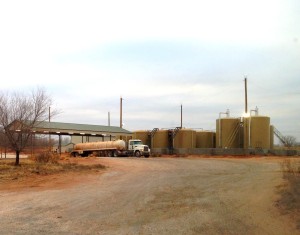In a much-watched case involving underground trespass, the Texas Supreme Court’s ruling issued last Friday amounts to a punt. Environmental Processing Systems v. FPL Farming raised the question of whether disposal well fluids disposed of thousands of feet below ground, which then migrate across property lines constitutes trespass. As you will remember from this prior blog, the Texas Supreme Court heard oral argument on this case one year ago.
Background
In this case, a Liberty County rice farmer sued his neighbor, a disposal well company, claiming that subsurface trespass occurred when waste water injected on the neighbor’s property spread across property lines. The disposal well company began operating its well in 1996, after obtaining the required state permit. During the initial permitting process, the rice farmer’s predecessor in interest contested the application, but then entered into a settlement agreement with the disposal well company, whereby he would withdraw his objection in return for $185,000. Several years later, when the rice farmer owned the property, he filed suit against the disposal well company claiming subsurface trespass. To read more a more in depth background discussion, click here.
The case made the windy road through lower courts, where a variety of verdicts were entered and overturned. Most recently, the Beaumont Court of Appeals found in favor of the rice farmer, holding that Texas does recognize a cause of action for subsurface trespass, that consent is an affirmative defense that must be proven by a defendant, that there were factual issues as to whether the farmer consented to the subsurface entry. Both parties appealed to the Texas Supreme Court.
Texas Supreme Court Ruling
The Texas Supreme Court found that a plaintiff claiming trespass must prove three elements: (1) entry; (2) onto the property of another; and (3) without the property owner’s consent or authorization. Here, the rice farmer failed to prove lack of consent. The court explained that the rice farmer offered no evidence that he did not consent to the subsurface migration. Without any such evidence, his trespass claim must fail.
The most interesting part of this case is actually the question that the Court did not decide: If all elements of trespass were proven, would Texas law recognize a claim of underground trespass? That question will be left for another day, as the court found itself “without the need to decide whether Texas law recognizes a cause of action for deep subsurface water migration.”
Read the full opinion here.
What Can We Learn?
First,this case answers, for the first time, whether consent is an element of a trespass claim (meaning the plaintiff bears the burden of proof) or an affirmative defense (meaning the defendant bears the burden of proof). This case makes clear that a plaintiff claiming trespass must offer evidence of lack of consent in order to succeed on his or her claim.
Second, this case illustrates a key legal point, namely, a plaintiff must affirmatively prove each element of his or her claim. Here, because the rice farmer erroneously believed that lack of consent was not an element of trespass, he did not offer any evidence to prove his lack of consent. This ended up being a fatal mistake when the Supreme Court held that lack of consent was, indeed, an element of trespass. Had the plaintiff offered evidence showing that he never consented to the subsurface migration of water, this case could have turned out differently and likely would have required the court to consider the validity of a subsurface trespass claim.
Finally, this case is a reminder that courts consider the cases and facts before them, and do not issue advisory opinions. Here, the trespass claim could be decided without deciding whether Texas would recognize a cause of action for underground trespass. Therefore, although many people involved–and perhaps even the parties to this case–would have liked to know the answer to that question, it was not one properly made in this case. Until a case is brought that turns on that issue, the court will not make a decision.












